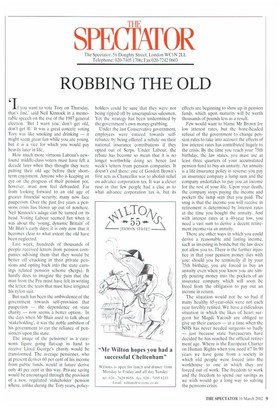ROBBING THE OLD
If you want to vote Tory on Thursday, that's fine,' said Neil Kinnock in a memorable speech on the eve of the 1987 general election. But I warn you: don't get old, don't get ill.' It was a great conceit: voting Tory was like smoking and drinking — it might seem great fun while you are young, but it is a vice for which you would pay heavily later in life.
How much more virtuous Labour's newfound middle-class voters must have felt a decade later when they thought they were putting their old age before their shortterm enjoyment. Anyone who is keeping an eye on the progress of their pension pot, however, must now feel defrauded. Far from looking forward to an old age of greater financial security, many now face pauperism. Over the past five years a pensions crisis has blown up out of nowhere. Neil Kinnock's adage can be turned on its head. Voting Labour seemed fun when it was about the 'young, dynamic Britain' of Mr Blair's early days; it is only now that it becomes clear to what extent the old have been neglected.
Last week, hundreds of thousands of people received letters from pension companies advising them that they would be better off chucking in their private pensions and opting back into the state earnings related pension scheme (Serps). It hardly does to imagine the pain that the man from the Pru must have felt in writing the letter, the tears that must have irrigated his nylon suit.
But such has been the ambivalence of the government towards self-provision that pauperism the dependence on state charity — now seems a better option. In the days when Mr Blair used to talk about `stakeholding", it was the noble ambition of his government to cut the reliance of pensioners upon the state.
The image of the pensioner as a careworn figure going flat-cap in hand to receive Lloyd George's charity would be transformed. The average pensioner, who at present derives 60 per cent of his income from public funds, would in future derive only 40 per cent in this way. Private saving would he encouraged through the provision of a new, regulated 'stakeholder' pension where, unlike during the Tory years, policy holders could be sure that they were not being ripped off by unscrupulous salesmen. Yet the strategy has been undermined by the government's own money-grabbing.
Under the last Conservative government, employees were enticed towards selfreliance by being offered a rebate on their national insurance contributions if they opted out of Serps. Under Labour, the rebate has become so mean that it is no longer worthwhile doing so; hence last week's letters from pension companies. It doesn't end there: one of Gordon Brown's first acts as Chancellor was to abolish relief on advance corporation tax. It was a clever ruse in that few people had a clue as to what advance corporation tax is, but its effects are beginning to show up in pension funds, which upon maturity will be worth thousands of pounds less as a result.
Few would want to blame Mr Brown for low interest rates, but the bone-headed refusal of the government to change pension rules to take into account the effects of low interest rates has contributed hugely to the crisis. By the time you reach your 75th birthday, the law states, you must use at least three quarters of your accumulated pension fund to buy an annuity. An annuity is a life insurance policy in reverse: you pay an insurance company a lump sum and the company undertakes to pay you an income for the rest of your life. Upon your death, the company stops paying the income and pockets the lump sum that you paid. The snag is that the income you will receive in retirement is determined by interest rates at the time you bought the annuity. And with interest rates at a 40-year low, you need a vast sum to derive a decent retirement income via an annuity.
There are other ways in which you could derive a reasonable and lasting income, such as investing in bonds, but the law does not allow you to. There is the further injustice in that your pension money dies with you: should you be terminally ill by your 75th birthday, you are forced to buy an annuity even when you know you are simply pouring money into the pockets of an insurance company which will soon be freed from the obligation to pay out an income in return.
The situation would not be so bad if many healthy 65-year-olds were not each year forcibly retired, We have a ridiculous situation in which the likes of heart surgeon Sir Magdi Yacoub are obliged to give up their careers — at a time when the NHS has never needed surgeons so badly — just because state bureaucrats have decided he has reached the official retirement age. Where is the European Charter on Human Rights when you need it? In 90 years we have gone from a society in which old people were forced into the workhouse to one in which they are forced out of work. The freedom to work and the freedom to spend our savings as we wish would go a long way to solving the pensions crisis.
















































































 Previous page
Previous page